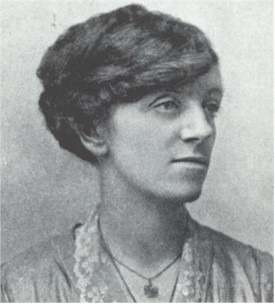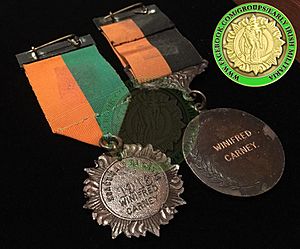Winifred Carney facts for kids
Quick facts for kids
Winifred Carney
|
|
|---|---|

Portrait of Carney
|
|
| Born |
Maria Winifred Carney
4 December 1887 Bangor, County Down, Ireland
|
| Died | 21 November 1943 (aged 55) |
| Resting place | Milltown Cemetery |
| Nationality | Irish |
| Other names | Winnie Carney |
| Known for | Political activism and involvement in the 1916 Rising |
| Political party | Sinn Féin |
| Spouse(s) |
George McBride
(m. 1928) |
Winifred Carney (born December 4, 1887, died November 21, 1943) was an important Irish woman. She worked for women's rights, helped workers get fair treatment, and fought for Ireland's freedom. She is also known as Winnie Carney.
Contents
Early Life and Education
Winifred Carney was born into a Catholic family in Bangor, County Down, Ireland. Her father was a traveling salesman, and her mother was Sarah Cassidy. Winifred had six brothers and sisters.
When she was young, her family moved to Falls Road, Belfast in Belfast. There, her mother ran a small sweet shop. Her father, who was Protestant, later left the family. This meant her mother had to support all the children.
Winifred went to the Christian Brothers School in Belfast. She later taught at the same school. Around 1910, she studied at Hughes Commercial Academy. She became one of the first women in Belfast to qualify as a secretary and shorthand typist. But Winifred wanted to do more than just office work.
Helping Workers and Women
In 1912, Winifred helped start the women's section of the Irish Textile Workers' Union in Belfast. She worked with Delia Larkin to create this union. This union helped women who worked in textile factories.
During this time, she met James Connolly, a famous Irish leader. She became his personal secretary. Winifred and Connolly became good friends. They worked together to make conditions better for women working in factories in Belfast. They also tried to improve women's rights and the right to vote for women.
Winifred also joined Cumann na mBan in 1914. This was a women's group that supported the Irish Volunteers. The Irish Volunteers were a group working for Ireland's independence.
The Easter Rising
Winifred Carney was a key person during the Easter Rising in 1916. This was a rebellion in Dublin where Irish people fought for independence from British rule. She was with James Connolly at the General Post Office, Dublin (GPO). The GPO was the main headquarters for the rebels.
Winifred was the only woman inside the GPO when the rebellion started. She went in with her typewriter and a Webley revolver. Even though she wasn't a fighter, she was given the rank of adjutant. This meant she helped with important tasks.
When Connolly was hurt, Winifred refused to leave his side. She stayed with him even when she was told to leave. She even wrote down his final orders when he was wounded. Winifred, along with Elizabeth O'Farrell and Julia Grenan, left the GPO with the other rebels. The building was on fire. They moved to Moore Street before the rebels surrendered.
Imprisonment and Release
After being captured, Winifred was held in Kilmainham Gaol. Then she was moved to Mountjoy Prison. She was later sent to an English prison called Aylesbury. Many women were released from prison a week after the leaders of the Rising were executed.
Winifred and another woman named Helena Molony were released just before Christmas in 1916. After the Anglo-Irish Treaty was signed, which created the Irish Free State, Winifred sided with those who were against the treaty. She was arrested several times for her beliefs. She was held in Armagh Gaol in 1922 but was released later that year.
Winifred often visited her political friends when they were in prison. She believed in supporting them.
Political Work and Elections
Winifred was one of the first Irish women to become a qualified secretary and typist. She worked as a clerk and was involved in the Gaelic League, which promoted the Irish language. She also worked for women's right to vote and for socialist causes.
In 1913, she helped raise money for Dublin workers who were on strike. Because of her strong involvement with the trade union, she became Connolly's typist. She typed his articles for newspapers. She was also a close friend and trusted advisor to him.
When World War I started in 1914, Winifred agreed with Connolly. They believed it was a good time to start a rebellion, even if it was a symbolic one.
In Cumann na mBan, she learned first aid and how to use a rifle. On April 14, 1916, Connolly asked her to join him at the GPO for the Easter Rising.
In 1917, Winifred was a delegate at the Belfast Cumann na mBan meeting.
She ran for Parliament in the 1918 United Kingdom general election. She was a candidate for Sinn Féin in Belfast Victoria. She received 539 votes but did not win. After losing the election, she continued her work with the Irish Transport and General Workers' Union until 1928. By 1924, she had joined the Labour Party. In the 1930s, she joined the Belfast Socialist Party.
After the Irish Civil War, Winifred became less involved in politics. She often spoke out against the government leaders at the time.
Later Life and Legacy
In 1928, Winifred married George McBride. He was a Protestant Orangeman and had been a member of the Ulster Volunteers. It's interesting because the Ulster Volunteers were formed before the Irish Volunteers, which Winifred was part of. Winifred's marriage to George McBride caused some people in her life to distance themselves from her. However, George was also a socialist like her. She continued to be involved in the trade union movement, working for the Irish Transport and General Workers' Union.
In the late 1930s, Winifred had serious health problems. These limited her political activities. She died in Belfast, Northern Ireland, on November 21, 1943. She is buried in Milltown Cemetery. Years later, her burial place was found, and a headstone was put up by the National Graves Association, Belfast. Because she married a Protestant, her husband's last name (McBride) was not allowed on her gravestone due to religious differences. They were married for fifteen years, and George McBride never remarried after Winifred's death.
In 2013, people remembered the seventieth anniversary of Winifred Carney's death. Almost one hundred people attended a parade to honor her work. Winifred Carney is highly respected among the many brave women who stood up for what they believed in, no matter the challenges they faced.
 | Calvin Brent |
 | Walter T. Bailey |
 | Martha Cassell Thompson |
 | Alberta Jeannette Cassell |



